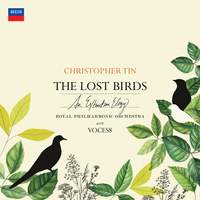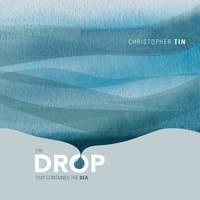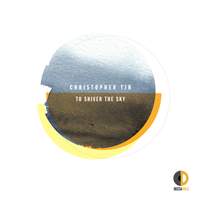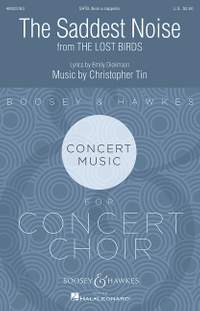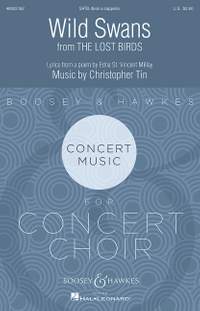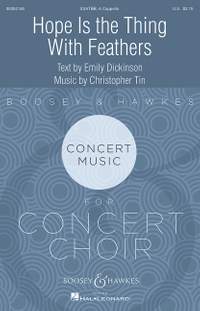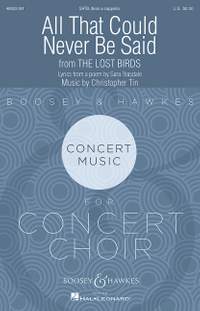Interview,
Christopher Tin on The Lost Birds
 Alongside scientists and political activists, artists and musicians are hardly strangers to environmentalist concerns and awareness-raising; a reworking of Mendelssohn's beloved Hebrides overture to illustrate declining whale populations, which hit the news recently, is just one example.
Alongside scientists and political activists, artists and musicians are hardly strangers to environmentalist concerns and awareness-raising; a reworking of Mendelssohn's beloved Hebrides overture to illustrate declining whale populations, which hit the news recently, is just one example.
Christopher Tin - a composer best known for the breakthrough song Baba Yetu but with a wide-ranging and eclectic discography as well as a lifelong concern for the natural world - takes inspiration from the loss of bird biodiversity in his latest work, The Lost Birds. It's a work that paradoxically combines the scope of a choral Requiem with the intimacy of a close-harmony ensemble, and sets a selection of poems responding to the unique position birds occupy within our cultural language. I spoke to Christopher to find out more about this piece.
The Lost Birds is by no means your first album based around elements from the natural world - The Drop That Contained the Sea and Calling All Dawns both had a similar inspiration. What is it about nature that makes it such a rich vein for you?
In large part it stems from a concern for the wellbeing of the natural world and the world that I'm going to be leaving behind for my four-year-old daughter. I grew up with environmentalist tendencies and attitudes and a concern for the preservation of nature. And maybe just a bit of existential dread at what's happening to the planet.
Those concerns have been there throughout, then, rather than being something new to The Lost Birds?
Yes, it's always been there. It's not surprising that it's woven its way into my works over the years, but I'm never one for being too obvious about it. I don't want to pen the anthem that simply says "save the birds!" - the type of music that I write isn't necessarily conducive to that punchy sound bite sort of activism.
First and foremost I always want my music to be enjoyable just as music, whether or not you understand what's being sung. That's why I've never been shy about using a multiplicity of languages. But once you get past the immediate musical enjoyment, I like for there to be secondary and tertiary layers of meaning – with a kind of soft-activist message embedded.
Like you say, on many of your previous albums you’ve made a feature of setting texts in a great number of different languages, both living and extinct. The Lost Birds, though, is entirely in English; what made you change course in this way?
With The Lost Birds I wanted the story to be understood through the words more than in my previous albums. Those other albums had a unity-in-diversity angle to them, whereas here I was setting out to tell a specific story, starting in the late nineteenth century and setting poets writing in that time - how these women saw the world, how they appreciated nature, and what symbolism birds had in their lives.
And on the creative side, too, I wanted to shift things up. Having done three albums consisting respectively of twelve songs in twelve languages (Calling All Dawns), ten songs in ten languages (The Drop That Contained the Sea) and eleven movements in eight languages (To Shiver the Sky)... it was time to shake up the paradigm for myself.
Despite your widespread work to date, to gamers of a certain age you’re known overwhelmingly for one song – Baba Yetu from Civilization IV, which just over a decade ago broke new ground by being the first piece of video game music to win a Grammy. How do you see the relationship between your soundtrack work and concert works like The Lost Birds?
At the end of the day, writing music is writing music. Video games are something I could go on and on about, about how wonderful a medium it is to work in. The fanbase is wonderful, the people I've worked with are wonderful. Especially a game like Civilization - you have no idea how many secret Civilization players there are all around the world! And I've found as a recording artist myself, having a piece of music in the opening menu screen of a game like Civilization is wonderful for your profile and visibility. Unlike with a film, every time somebody boots up a game they have to hear your opening menu music. And as we know, repeated exposure to a piece makes you more fond of it.
Christopher Tin's phenomenally successful Baba Yetu, performed by the Soweto Gospel Choir with the Royal Philharmonic Orchestra.
When I first got into this business there was very much a wall between people who worked on the media side of things and people who worked on concert pieces. I'm grateful that that wall seems to be breaking down, though we’re still not yet at a point where you might hear a piece from the Final Fantasy franchise programmed next to Beethoven.
I remember a few years ago doing a concert of symphonic music from the Zelda series to an absolutely packed hall of devoted fans of that style of music - which presumably won't surprise you, but might surprise some people.
Yes, many of us who work in the video-game world and straddle the boundary between that and the concert-composing world were eager to make the two worlds live in harmony on concert programmes. The embrace from the classical side is a little slower, but it's a good thing for the health of classical music to acknowledge that a significant portion of the people being exposed to orchestral music nowadays are encountering it through a medium like video games.
And so much of the classical canon was written as entertainment music itself! So it's odd that someone would be snobbish about video-game music and yet take incredibly seriously an opera that was only ever meant to run for a few performances...
Right! And I think game music will age well. This one song, Baba Yetu from Civilization IV, has sort of entered the choral canon, and I'm eternally grateful that that happened to me. The choral canon is perhaps wider in terms of appreciation for different styles of music. The concert-hall hasn't quite reached the same level of diversity in terms of where its music comes from - it's still very much the big classical warhorses that they know will sell. And I do understand the reasons behind that - financial reasons, the need to cater to your donors, to fill the seats. With time, and with the continued growth of the video-game canon, we will hopefully see the core classical market embracing that a little more.
Individual extinctions are growing increasingly common, with all manner of animal species and subspecies being lost – tortoises, frogs, dolphins, ibexes, rodents, snails and more in just the last few years. What led you to focus on the loss of birds in particular?
Two reasons - firstly, birds are written about in poetry more than any of the other kinds of animals. They're so present in our language, and from the dawn of civilisation they've had this symbolic place for us. And during the Romantic era when most of this piece is set, they were particularly prominent in poetry as sources of symbolism.
More than that, though, I was interested in the issue of bird extinctions itself. More than a decade ago when I wrote the music for a documentary, I learned about the story of the passenger pigeon, which was hunted from a population of billions to nothing over a few decades.

Each bird species lost presumably had its own distinctive cry which will now never be heard again. Did you consider immortalising them by incorporating those into the music (perhaps in the vein of Messiaen’s Catalogue d’Oiseaux?)
Ultimately I decided against doing that; it had been done before, in a number of ways, from Beethoven's Pastoral to Messiaen. Messiaen, I think, had a very "photorealistic" depiction of how birds actually sounded in his works, and in recent years I've been following a great Instagram account by a Juilliard composer called Alexander Liebermann who transcribes, in very careful detail, the exact songs of various birds.
It was more important to me to convey an emotion than it was to encapsulate a sound exactly. I also didn't want anything to pull the listener out of the moment. Musically speaking, any sort of gesture like that - especially if you treat it in a Messiaen-like way - is going to pull you out.
The creative sector is becoming more and more concerned with calling audiences to action on the environment through the arts. But how much impact do you think works such as The Lost Birds will have? Do you worry that people will simply hear it, feel sad for a bit, and then carry on as before?
That's entirely possible. My own approach to activism reflects the way I like to engage with environmental and social issues myself, through art - I could have been more forceful in the message, but the extra amount of urgency might have turned people away.
The other aspect is something that I've been thinking about in recent years, especially since To Shiver the Sky, which was a celebration of mankind's achievements and in particular flight. I came to the conclusion that music was not very good at really explaining issues or educating people, but what it was good at was inspiring people. Nothing I write is going to cure cancer or bring world peace, but maybe somebody out there will have found some beauty in something I've composed and will be inspired themselves to tackle these problems.
Alongside the release of the recording and the full score, five movements from The Lost Birds are being published as standalone pieces; is the aim for these to enter the repertoire and amplify the environmentalist message?
That's part of the goal, yes. This is certainly one of my more performable pieces by choirs. It doesn't require a full orchestra and actually there's a chamber orchestration that I'm working on now that will make it even more performable for groups that only have the budget to hire, say, five players. Likewise, I felt the subject matter lent itself better to more intimate forces. Voces8, who I specifically wrote for, sound fantastic as just an a cappella ensemble.
Voces8 perform The Saddest Noise from The Lost Birds
Yes, the difference between that and the big-choir sound that works of this kind often use was very noticeable - so that was a deliberate choice?
Yes - though equally I just really wanted to work with Voces8! I've known about them since their first album. What they do is perfect for what I'm trying to convey with this album. More than any other album or work of mine, this one was composed with the idea of a cappella performance very much at the forefront of my mind. And that's a different compositional process. A lot of my other works may not stand up to being performed a cappella without significant rearrangement.
That's perhaps why my earlier albums have a much wider range of tone colours. Not only the fact that I'm using lots of different artists and ensembles and a huge orchestra but also what we were talking about before - earlier on I was adopting a unity-in-diversity approach, whereas this is very much around a specific story. The continuity that I got working with Voces8 really lent itself to that.
And is the relatively simple instrumentation part of that too?
Absolutely. I wanted to be able to subtract the instrumentation and still have a whole piece. So there are alternate versions of certain movements, where instead of singing "ooh"s to back up an orchestral interlude they're actually singing words, and things like that. It was deliberate from the start, and it's for a multitude of reasons. Among them, yes, I want my music to be more programmable; at the moment it's particularly hard to programme something that has an enormous orchestra.
And creatively speaking, I don't want to do the same thing over and over again. This is probably my most different work from everything I've done previously. There's always a chance that some people will say "I liked the old Christopher Tin better" - but equally, new people may find that they love the new sound, and want to explore further. I've never wanted to be the person who just wrote Baba Yetu over and over again. I could do that - honestly, I could write that style endlessly if I wanted to. But that's not me. I will occasionally go back and write another Baba Yetu-style piece, of course, but I don't want to make that my only contribution to the canon.
Voces8, Royal Philharmonic Orchestra, Christopher Tin
Available Formats: CD, MP3, FLAC, Hi-Res FLAC
Angel City Chorale, Soweto Gospel Choir, Royal Philharmonic Orchestra, Christopher Tin (and numerous other artists)
Available Formats: MP3, FLAC, Hi-Res FLAC
Anna Lapwood (organ), Pene Pati (vocals), Danielle de Niese (vocals), Royal Opera Chorus, Royal Philharmonic Orchestra, ModernMedieval, The Assembly, Pembroke College Girls' Choir, Christopher Tin
Available Formats: MP3, FLAC, Hi-Res FLAC
Mixed choir (SATB divisi) a cappella
Available Format: Sheet Music
Mixed choir (SATB divisi) a cappella
Available Format: Sheet Music
Mixed choir (SSATBB) a cappella
Available Format: Sheet Music
Mixed choir (SATB divisi) a cappella
Available Format: Sheet Music


